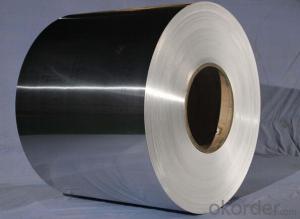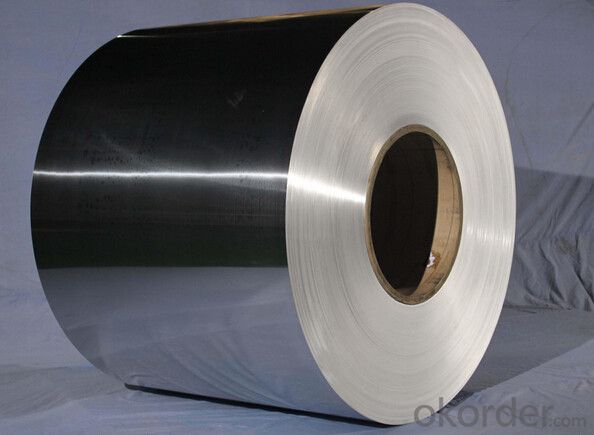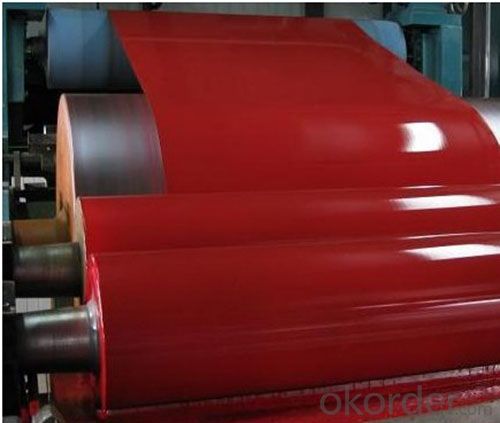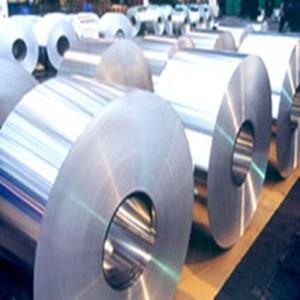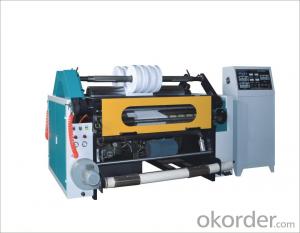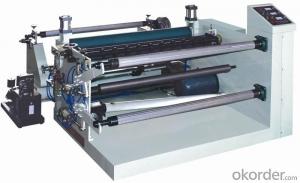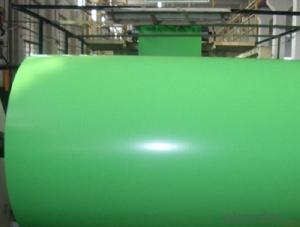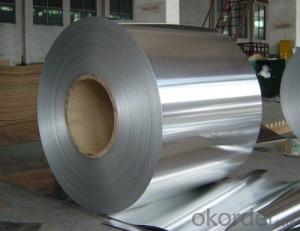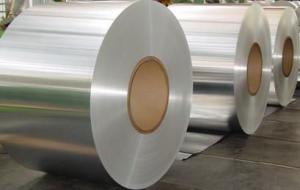Aluminum Coil Slitter Rewinder Machine for Coated Aluminium Coil Cladding Panel
- Loading Port:
- Shanghai
- Payment Terms:
- TT OR LC
- Min Order Qty:
- 5 m.t.
- Supply Capability:
- 60000 m.t./month
OKorder Service Pledge
OKorder Financial Service
You Might Also Like
Specification
Coated Aluminium Coil for Aluminium Cladding Panel
Description
Alloy | 1060, 1100, 3003, 8011, etc. |
Temper | H16, H18, H24, H26, H28 |
Thickness | From 0.05mm to 3.0mm |
Width | Standard width:1240mm |
Special width:1300mm, 1520mm, 1570mm, 1595mm | |
Diameter | Standard dia:1200mm |
Interior dia:150mm,405mm,505mm | |
Weight | 2.5 T/coil,3.0 T/coil |
Coating | PE, PVDF, ACRYLIC |
Surface | Embossed, mill finish, coated |
Color | AS to code RAL |
Gloss | 10-90%(EN ISO-2813:1994) |
Coating Thickness | PE: more than 18 micron |
PVDF: more than 25 micron | |
Coating Hardness(pencil resistance) | More than 2h |
Coating adhesion | 5J (EN ISO-2409:1994) |
Impact Resistance | No peeling or cracking(50 kg/cm,ASTMD-2794:1993) |
Flexibility(T-bend) | 2T |
MEK resistance | More than 100 |
Advantage | 1.High temperature resistant 2.Weathering resistant 3.Scrubbing resistant 5.Acid or alkali proof 6. Fireproof 7.Light weight material is easy to construct and install |
Out package | Wooden splint with export standard |
Application | ACP, wall cladding, facades, roofs and canopies, ceilings, signboards, blind window, display platforms, electrical panels, etc |
Manufacturing
Decoiler → Accumulator →Tension Leveler →Acid & Alkali Cleaner → Rinse →Conversion Treatment → Priming coater →Infrared Curing Oven →Main coater →Floatation Curing Oven →Strippable Film Applicator → Exit Accumulator → Recoiler
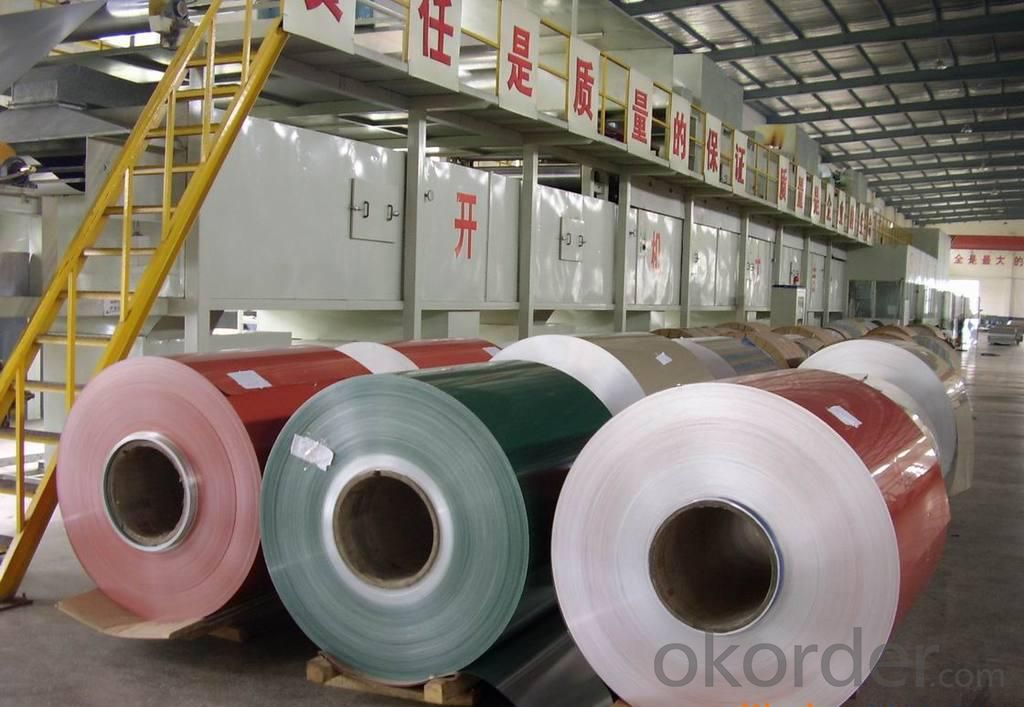
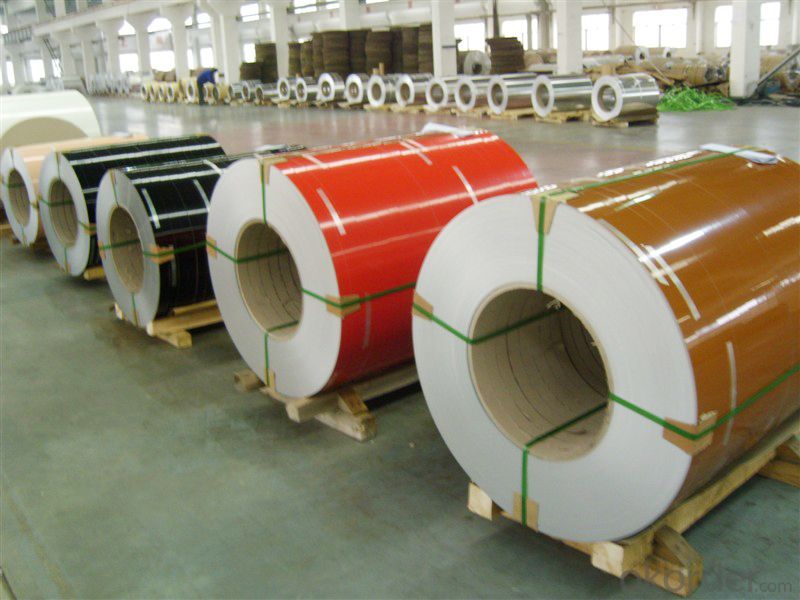
Polyester Coatings (PE)
PE (polyester) coatings exhibit an excellent combination of hardness, flexibility, flow, appearance, and superior resistance to dirt retention in indoor and outdoor applications. These coatings are highly resistant to abrasion, metal marking, staining, and marring, and require minimal maintenance. Glazetech uses polyester paints which provide excellent colour and gloss retention properties.
Polyvinylidene Fluoride Coatings (PVDF)
PVDF (polyvinylidene fluoride) is a chemical resistant thick film barrier coating commonly used in architectural applications where both excellent appearance and substrate protection must be maintained over a long period of time. This coating is unaffected by most chemicals and solvents and has excellent wear and abrasion resistance. PVDF also has a high dielectric strength, excellent resistance to weathering and the ability to self extinguish.
Application
Widely used in manufacturing of products as well as other industrial applications like:
Products Materials: PP cap stock, the traffic sign, air-conditioner heat and exchangers, food container, household foil, pharmaceutical packing, cigarettes packing etc.
Building Materials: aluminum curtain wall base plate, ACP, aluminum, ceilings, aluminum sheets, honeycomb panels and aluminum roofing, lighting decoration, household electrical appliances, food package (such as pop can cover & ring-pull), furniture ect.
FAQ
--Q: Do you provide free samples?
--A: Yes, free samples will be sent to you on freight at destination.
--Q: Can I get your latest products catalogue?
--A: Yes, it will be sent to you in no time.
--Q: What is the MOQ?
--A: 2 tons
--Q: What are your payment terms?
--A: We accept L/C, T/T.
--Q: What kinds of alloy can you supply?
--A: 1000 series: 1050, 1060, 1070, 1100, 1145, 1200
3000 series: 3003, 3004, 3105, 3104
5000 series: 5052, 5083, 5754, 5182
6000 series: 6061, 6063, 6062, 6063
8000 series: 8011, 8021
--Q: What kinds of temper can you supply?
--A: O-H112: O,H12,H14,H16,H18,H22,H24,H26,H,32,H34,H111,H112
T3, T4, T6
- Q: How are aluminum coils processed to achieve desired mechanical properties?
- Aluminum coils are processed to achieve desired mechanical properties through a combination of cold rolling, annealing, and heat treatment. Cold rolling reduces the thickness of the aluminum coil, increasing its strength and hardness. Annealing, a heat treatment process, is then applied to soften the material and improve its formability. Additional heat treatments may be conducted to further enhance mechanical properties, such as tempering to increase toughness or solution heat treatment to improve strength and corrosion resistance. These processing techniques allow manufacturers to tailor the mechanical properties of aluminum coils to meet specific application requirements.
- Q: What is the role of aluminum coils in the automotive industry?
- Aluminum coils have a significant impact on the automotive industry, specifically in vehicle manufacturing. These coils are utilized to produce various parts and components like radiators, condensers, and air conditioning systems. One of the primary reasons why aluminum coils are favored in the automotive industry is due to their lightweight properties. Aluminum is considerably lighter compared to other metals like steel, making it an excellent option for enhancing fuel efficiency and reducing the overall weight of vehicles. Consequently, this not only improves vehicle performance but also decreases emissions, thereby contributing to a more environmentally friendly transportation sector. Moreover, aluminum coils possess exceptional thermal conductivity, which is crucial in automotive applications. They efficiently dissipate heat, ensuring the proper functionality of cooling systems and preventing overheating. This is particularly important for components such as radiators, as effective heat transfer is essential for maintaining an optimal engine temperature. Furthermore, aluminum coils exhibit high corrosion resistance. They naturally develop an oxide layer that safeguards against rust and corrosion, rendering them more durable and long-lasting compared to other metals. This corrosion resistance is particularly vital in the automotive industry, where vehicles are exposed to various environmental factors such as moisture, salt, and chemicals. Additionally, aluminum coils offer design flexibility. They can be easily molded and shaped into different sizes and configurations, enabling manufacturers to produce complex and customized components. This design flexibility allows automotive companies to optimize space and maximize efficiency in their vehicles. To summarize, aluminum coils play a crucial role in the automotive industry. Their lightweight nature, excellent thermal conductivity, corrosion resistance, and design flexibility make them an ideal choice for various automotive applications. Consequently, they contribute to improved vehicle performance, fuel efficiency, and overall durability.
- Q: What are the potential applications of coil-laminated aluminum coils?
- Coil-laminated aluminum coils have a wide range of potential applications in various industries. They can be used in the manufacturing of automotive parts, such as body panels and interior components, due to their lightweight yet durable nature. Additionally, they are suitable for building and construction purposes, including roofing, siding, and insulation, as they offer excellent corrosion resistance and thermal conductivity. Furthermore, coil-laminated aluminum coils find use in electrical industries for producing transformers, capacitors, and other electrical components due to their excellent electrical conductivity. Overall, their versatility and desirable properties make coil-laminated aluminum coils valuable in numerous applications across different sectors.
- Q: What are the potential risks of using aluminum coils in specific applications?
- Using aluminum coils in specific applications presents several potential risks. Firstly, due to its high reactivity, aluminum can undergo oxidation and form aluminum oxide. While this oxide layer can be protective, it can break down in certain environments, like acidic or alkaline conditions, leading to corrosion and compromising the coils' structural integrity and lifespan. Secondly, aluminum coils have lower strength compared to metals like steel, making them vulnerable to deformation or damage under heavy loads or high pressure. Mechanical stress can cause bending or cracking, resulting in potential failure. Furthermore, aluminum has a relatively low melting point compared to metals like copper or iron. As a result, when exposed to high temperatures, such as in heating or cooling systems, there is a risk of the coils melting or deforming, leading to system malfunctions, reduced efficiency, or safety hazards. Another risk lies in the electrical conductivity of aluminum coils. While aluminum conducts electricity well, its resistance is higher than copper. This can lead to increased power losses and reduced energy efficiency in electrical applications. Additionally, aluminum coils may be more prone to electrical arcing or sparking, posing a fire hazard. Lastly, it is important to note that aluminum is lightweight, which can be advantageous, but it also means that aluminum coils may have lower durability and resistance to physical impacts or external forces compared to heavier metals. In environments with vibrations, impacts, or other mechanical stresses, the coils may be more susceptible to damage or premature failure. In conclusion, although aluminum coils offer benefits like light weight, good thermal conductivity, and corrosion resistance, it is vital to carefully consider the potential risks associated with their use in specific applications. Proper design, maintenance, and compatibility with operating conditions are crucial to mitigate these risks and ensure the safe and effective performance of aluminum coils.
- Q: I have a aluminum sign that I store in the garage and it got a couple specks of rust on it which I don't like because I use it for my DJ shows. How can I get rid of the rust before it gets too bad without painting over it?
- Aluminum doesn't rust.
- Q: What style of womens Oakley sunglasses come in aluminum? I need a tough pair and would like interchangeable lenses option also.
- You can go to this website to buy it.My friends have bought the oakley sunglasses from this site,so you can rest assured,it is the real website.The products are nice replicas,they are of high quality and also lower price.I believe you can buy the one you want from this site.
- Q: Can aluminum coils be used in heat sinks?
- Yes, aluminum coils can be used in heat sinks. Aluminum is a commonly used material for heat sinks due to its excellent thermal conductivity properties, which allow it to efficiently transfer heat away from the source. The coil shape helps to increase the surface area, enhancing heat dissipation.
- Q: Are aluminum coils compatible with other building materials?
- Yes, aluminum coils are compatible with other building materials. Aluminum is a versatile material that can be used in conjunction with various building materials such as steel, concrete, glass, and wood. It is commonly used in construction projects for roofing, cladding, and façade systems, as well as in HVAC and electrical applications. Aluminum's corrosion resistance and lightweight properties make it a preferred choice for integration with other building materials.
- Q: Are aluminum coils suitable for electrical transformers?
- Electrical transformers can indeed utilize aluminum coils. Aluminum, being a lightweight and cost-effective material, presents numerous advantages when it comes to transformer construction. Its electrical conductivity is outstanding, comparable to that of copper, which ensures efficient power transfer. Moreover, aluminum coils exhibit lower resistance than their copper counterparts, thereby reducing power losses and enhancing energy efficiency. The utilization of aluminum coils also aids in weight reduction, resulting in easier handling and transportation. Nonetheless, due to their marginally lower conductivity, aluminum coils necessitate larger cross-sections compared to copper coils. Consequently, transformers employing aluminum coils may exhibit a slightly larger size. Nevertheless, overall, aluminum coils serve as a viable and extensively employed substitute for copper coils in electrical transformers, offering cost savings, high conductivity, and improved energy efficiency.
- Q: How are aluminum coils manufactured?
- Aluminum coils are manufactured through a process known as aluminum coil rolling. This process involves several steps that transform aluminum ingots into coils of various sizes and thicknesses. The first step in manufacturing aluminum coils is aluminum smelting, where raw aluminum ore is extracted and refined into aluminum ingots. These ingots are then heated in a furnace to a specific temperature, where they become malleable and ready for the rolling process. The second step is hot rolling, where the heated aluminum ingots are passed through a series of rolling mills. These mills apply pressure to the ingots, gradually reducing their thickness and increasing their length. The aluminum ingots are rolled back and forth between multiple rollers to achieve the desired thickness and shape. This process also helps to improve the mechanical properties and surface finish of the aluminum. After hot rolling, the aluminum coils undergo a process called cold rolling. In this step, the coils are further reduced in thickness using a series of cold rolling mills. Cold rolling improves the dimensional accuracy, surface finish, and mechanical properties of the aluminum. It also helps to enhance the strength and hardness of the material. Once the desired thickness is achieved, the aluminum coils may undergo additional processes such as annealing or tempering. Annealing involves heating the coils and then slowly cooling them to relieve internal stresses and improve their ductility. Tempering, on the other hand, involves reheating the coils to a specific temperature and then rapidly cooling them to enhance their strength and hardness. After these processes, the aluminum coils are usually inspected for quality control purposes. They are checked for any defects, such as surface imperfections or thickness variations, and any necessary corrections are made. Finally, the aluminum coils are typically cut into smaller sizes and packaged for distribution to various industries that use them for different applications, such as in the manufacturing of automobiles, appliances, construction materials, and packaging. In conclusion, the manufacturing of aluminum coils involves processes such as smelting, hot rolling, cold rolling, annealing, tempering, and quality control checks. These steps ensure that the aluminum coils meet the required specifications in terms of thickness, strength, and surface finish.
Send your message to us
Aluminum Coil Slitter Rewinder Machine for Coated Aluminium Coil Cladding Panel
- Loading Port:
- Shanghai
- Payment Terms:
- TT OR LC
- Min Order Qty:
- 5 m.t.
- Supply Capability:
- 60000 m.t./month
OKorder Service Pledge
OKorder Financial Service
Similar products
Hot products
Hot Searches
Related keywords
